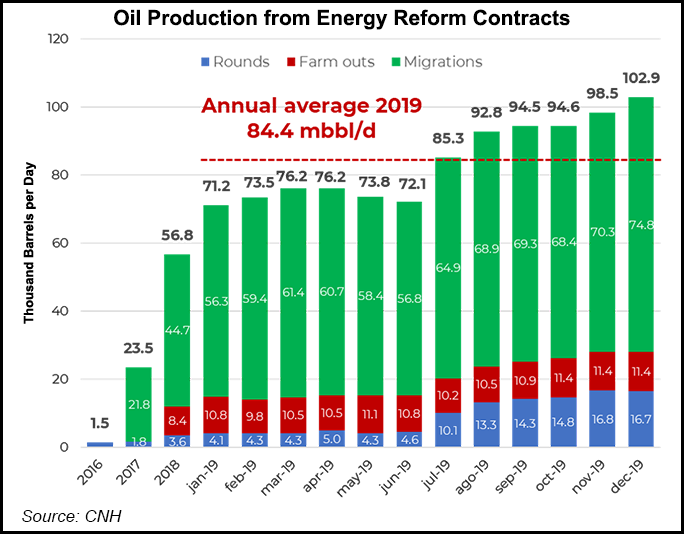NGI Mexico GPI | E&P | NGI All News Access
Italy’s Eni Strikes Oil Offshore Mexico
A consortium led by Italian operator Eni SpA has made a light oil discovery offshore Mexico in the Salina del Istmo basin of the Cuencas del Sureste oil and gas province.

The Saasken-1 NFW well was drilled in a water depth of 1,115 feet and reached a total depth of 12,566 feet, Eni said Monday.
The well discovered 262 feet of net pay of good quality oil in the Lower Pliocene and Upper Miocene sequences, Eni said, adding, “The reservoirs show excellent petrophysical properties. An intensive data collection has been carried out on the well and the data acquired indicate a production capacity for the well of more than 10,000 bbl of oil per day.”
Based on preliminary estimates, the Saasken discovery could contain 200-300 million bbl of oil in place, Eni said.
The well was drilled at Block 10, which upstream regulator Comisión Nacional de Hidrocarburos (CNH) awarded to the consortium through the Round 2.1 bidding process in 2017.
Eni holds a 65% operating interest in Block 10, with working interests also held by Lukoil and (20%) and Capricorn Energy Mexico (15%), a wholly owned subsidiary of Cairn Energy PLC.
Although CNH has approved Capricorn’s 15% share in the project, Eni said the signature process for the revised production sharing contract to reflect the change in the JV working interest is ongoing.
In mid-2019, Eni became the first private sector operator to record offshore oil production in Mexico at the Area 1 offshore project, which was awarded through the Round 1.2 process in 2015.
Calling Mexico “a core country in Eni’s strategy of future organic growth,” the company said Monday that it is producing about 15,000 boe/d at Area 1 and expects to reach a plateau of 100,000 boe/d in the first half of 2021.
“Eni is also planning an important exploration campaign in the other licenses held in Mexico,” said the company, which holds rights in eight exploration and production (E&P) blocks in the Sureste Basin. Of the eight, six are operated by Eni.
The bid rounds were made possible by Mexico’s 2013 constitutional energy reform, which ended state oil company Pemex’s (Petróleos Mexicanos) monopoly in the E&P segment.
Mexico’s president, Andrés Manuel López Obrador, has since suspended oil and gas bid rounds, betting instead on Pemex to restore oil and gas production levels in the country.
The Eni discovery follows the approval last week by CNH of the ultra-deepwater Max-1XP well, to be drilled by a local subsidiary of Royal Dutch Shell plc in the Salina del Istmo basin.
Investment by Shell in the drilling and abandonment of the exploration well will total $91.8 million, CNH said, adding that it will be drilled in a water depth of 8,238 feet and reach a total depth of 24,541 feet.
Shell has contracted the Deepwater Thalassa drilling rig for the operation, with drilling set to begin March 12 and conclude on June 7.
The drilling site is located 199 miles off the coast of Tabasco state, and is part of a tract awarded to Shell through the Round 2.4 process in 2018.
Private sector oil and natural gas output in Mexico stood at 47,848 b/d and 220.3 MMcf/d, respectively, as of December 2019, up from 31,373 b/d and 164,017 MMcf/d in December 2018, CNH data show.
Pemex, meanwhile, produced 1.66 million b/d of oil and 3.69 Bcf/d of gas in December 2019, versus 1.68 million b/d and 3.52 Bcf/d in the similar 2018 month.
A total of 111 E&P contracts awarded through the energy reform are currently in effect. These include contracts awarded via bid rounds, as well as farmout tenders at former Pemex-operated blocks, and the migration of oilfield services contracts to E&P contracts.
The energy reform contracts include private sector-operated projects as well as the 100% Pemex-operated Ek-Balam project.
Production from these contracts averaged 84,400 b/d in full-year 2019, up from 56,800 b/d in 2018.
© 2024 Natural Gas Intelligence. All rights reserved.
ISSN © 2577-9877 | ISSN © 2577-9966 |
